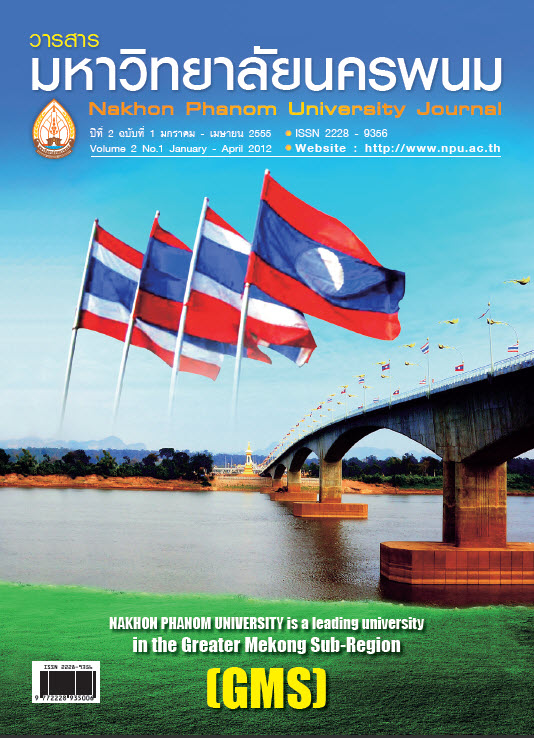การหมุนเวียนพนักงานเพื่อคุณภาพการปฏิบัติงานกองซ่อมบำรุงอากาศยานขั้นโรงงาน ฝ่ายช่างดอนเมือง บริษัท การบินไทย จำกัด (มหาชน)
Main Article Content
Abstract
การวิจัยครั้งนี้ มีวัตถุประสงค์เพื่อ 1) ศึกษาความคิดเห็นของพนักงาน ด้านความรู้เกี่ยวกับงานที่ทำ ด้านปริมาณของงานสำเร็จตามที่ได้รับมอบหมายและด้านความเสียหายที่เกิดจากการปฏิบัติงาน 2) ศึกษาความสัมพันธ์ระหว่างการหมุนเวียนพนักงานและคุณภาพการปฏิบัติงานกองซ่อมบำรุงอากาศยานขั้นโรงงานฝ่ายช่างดอนเมือง บริษัท การบินไทย จำกัด (มหาชน) กลุ่มตัวอย่างที่ใช้วิจัยในครั้งนี้ มีจำนวน 152 คน ประกอบด้วยกลุ่มที่ 1 ช่างซ่อมปีกและเครื่องยนต์อากาศยาน จำนวน 50 คน กลุ่มที่ 2 ช่างซ่อมลำตัวอากาศยาน จำนวน 51 คน กลุ่มที่ 3 ช่างซ่อมห้องนักบินและห้องโดยสาร จำนวน 51 คน เครื่องมือที่ใช้การเก็บรวบรวมข้อมูลเป็นแบบสอบถามประมาณค่า 5 ระดับ มีค่าความเชื่อมั่น 0.75 สถิติที่ใช้ในการวิเคราะห์ข้อมูล ได้แก่ ร้อยละ ค่าเฉลี่ย ส่วนเบี่ยงเบนมาตรฐาน สถิติที่ใช้ในการทดสอบสมมติฐาน ได้แก่ ไคสแควร์ ผลการวิจัยพบว่า พนักงานทั้ง 3 กลุ่ม มีระดับความความคิดเห็นต่อคุณภาพการปฏิบัติงานเฉลี่ยอยู่ในระดับปานกลาง เมื่อพิจารณาเป็นรายด้านพบว่า ด้านที่มีค่าเฉลี่ยสูงสุด คือ ด้านปริมาณของงานสำเร็จตามที่ได้รับมอบหมาย ด้านที่มีค่าเฉลี่ยน้อยที่สุด คือ ความเสียหายที่เกิดจากการปฏิบัติงาน การหมุนเวียนพนักงานทั้ง 3 กลุ่ม ที่จำแนกตามการปฏิบัติงานส่งผลต่อคุณภาพในการปฏิบัติงานโดยรวมและรายด้านพบว่าแตกต่างกันอย่างไม่มีนัยสำคัญทางสถิติ
The purposes of this research were: 1) to examine the opinions of staff on their knowledge of work, the completion of their assigned work, and damage caused by the operation and 2) to study the relationship between the personnel rotation and the operational quality of the Aircraft Heavy Maintenance Division, Technical Department (Don Mueang), Thai Airways International PLC. The sample groups used in the study were 152 subjects consisting of 50 mechanics from the Wing Group, 51 mechanics from the Floor Group, and 51 mechanics from the Cabin Group. The instrument used to collect data was a set of five-point rating scale questionnaires with the reliability coefficient of 0.75. The statistics used to analyze data were percentage, mean and standard deviation. Chi-square tests were used to test hypotheses. The results of the research revealed that the opinions of the staff from all of the three groups on the operational quality were at a moderate level. When considering individual aspects, it was found that the aspect with the highest mean score was the completion of the assigned work, while the aspect with the lowest mean score was the damage caused by the maintenance operation. In addition, the personnel rotation of the three groups classified by the operation had no different effects on the overall and individual aspects of the operational quality.


